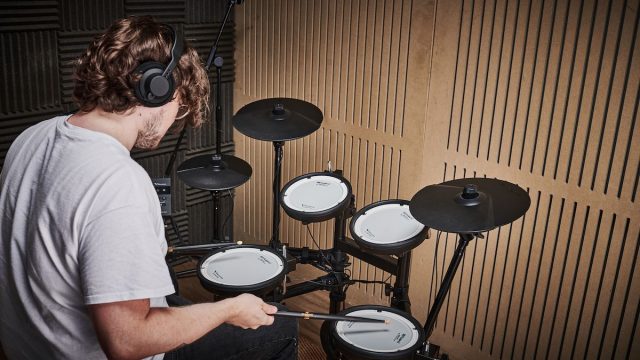Are you thinking of learning to play the drums? In this article, we’re collaborating with Diego Cardini from The Drum Ninja to give you the low down on electric drum kits.
Electronic drum kits are a game-changer, especially if you’re just starting out. Forget about needing a huge space or making too much noise. These kits are compact, quiet (when you need them to be), and super versatile. It’s like having a whole drum set in your living room, without the hassle.
In this article, I’ll guide you through everything you need to know to get started. So, if you’ve got a passion for grooves and a bit of curiosity, you’re all set. Let’s make some noise, the neighbour-friendly kind, of course!
How to start playing drums with an electronic drum kit
1. Choosing Your Electronic Drum Kit
Choosing the right electronic drum kit is a crucial first step. It’s essential to think about your specific needs. Are you looking for something that fits in a tight space, or do you have room for something larger?
The variety of sounds and features available can be overwhelming, so it’s important to prioritize what’s most important for you. Then, dive into some research. Look at different brands and models, but keep your budget in mind. Remember, though, that investing a bit more can often get you a kit that lasts longer and sounds better. If you can, try out different kits.
Feeling the response of the pads and pedals and finding what’s comfortable for you is key to your enjoyment and progress.
2. Setting Up Your Kit
Once you’ve got your kit, finding the right place in your home to set it up is your next task. You need enough room to sit comfortably and move around a bit.
When assembling the kit, follow the instructions carefully and take the time to adjust the height and angles of the pads and cymbals. This customization will make playing more comfortable and enjoyable, fitting the kit to your personal style and physique.
3. Getting Started with Basic Beats
Getting to know your drum kit intimately is where the fun begins. Spend some time understanding what each part of your kit does. Start your drumming journey with simple rhythms. Focus on keeping a steady beat and tempo.
There are plenty of online tutorials and drumming apps available that can guide you through these initial steps. This foundational practice is vital for developing your skills.
4. Practice Techniques
Consistent practice is the key to improvement. Aim for at least 15-20 minutes a day to start. One critical aspect to focus on is your timing.
Playing along with a metronome or backing tracks can help develop a strong sense of rhythm and timing. This discipline will pay off as you advance in your drumming.
5. Amplifying Your Sound
When it comes to practising quietly, headphones are your best friend. They allow you to hear the full range and nuance of your electronic drum kit without disturbing others.
But when you’re ready to share your music, connecting your kit to speakers is the way to go. Make sure the speakers are compatible with your drum kit for the best sound quality. This setup is perfect for performances or just jamming with friends.
6. Exploring and Experimenting
One of the great things about electronic drum kits is the variety of sounds you can explore. Don’t be afraid to experiment with different drum types and effects.
Many kits also allow you to record your playing. Listening back to your sessions is incredibly valuable for identifying areas for improvement and tracking your progress.
Frequently Asked Questions
Q: Can you learn to play drums on an electronic drum kit?
A: Absolutely! Electronic drum kits are an excellent tool for learning to play the drums. They offer a realistic experience that closely mimics playing an acoustic drum set.
The major advantage is the ability to practice at lower volumes, thanks to headphone compatibility, making them ideal for home use. They also often come with built-in learning tools and metronomes, which can be incredibly helpful for beginners.
Q: Are electronic drum kits good for beginners?
A: Yes, electronic drum kits are particularly well-suited for beginners. They’re less intimidating than acoustic sets and offer a range of features that aid learning.
The volume control, for example, is a big plus, allowing practice at any time without disturbing others. Additionally, the variety of sounds and settings available can make practising more engaging and fun for a beginner, keeping the learning process interesting and varied.
Q: Can you use regular drumsticks on electronic drums?
A: Definitely. You can use regular drumsticks on electronic drums without any issues. In fact, it’s recommended to use the same sticks that you would use on an acoustic drum set to maintain a consistent feel.
However, some drummers opt for sticks with nylon tips for a slightly different response and to potentially reduce wear on the drum pads. But overall, your regular wooden drumsticks will work just fine.
Conclusion
Embarking on the journey of learning to play the drums can be an exhilarating experience, and choosing an electronic drum kit as your starting point is a wise and practical decision. These kits offer a blend of versatility, convenience, and technological innovation, making them a fantastic choice for beginners.
As you start practising, remember that consistency and patience are your best allies. Even a few minutes a day can lead to noticeable improvements.
Electronic drum kits are not just beginner-friendly; they are instruments that can grow with you as you advance in your skills. Their ability to accommodate silent practice, coupled with the fun of experimenting with different sounds and settings, makes them a continuously rewarding musical investment.
So, whether you’re practising late into the night with headphones on or rocking out with speakers, the world of electronic drumming is full of possibilities.
About the author Diego Cardini
Crazy about drums, the founder of thedrumninja.com has carried a passion for drumming since the age of 12. Having played in numerous bands, He navigated through various musical styles including Rock, Progressive, Pop, and Jazz-Rock. Diego started the platform to share his knowledge and create a comprehensive resource for drummers of all levels.






